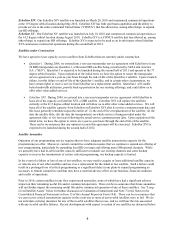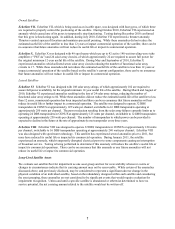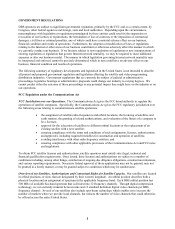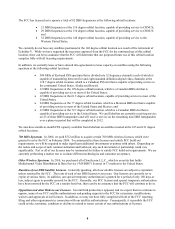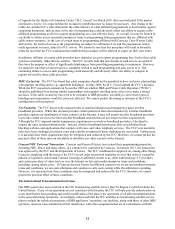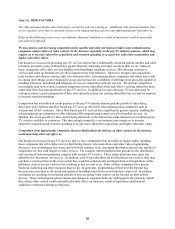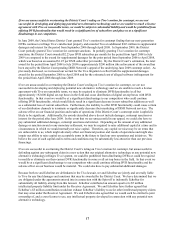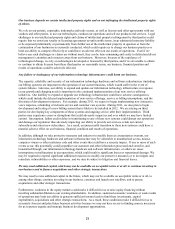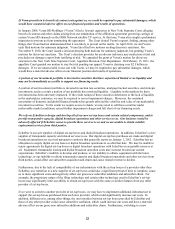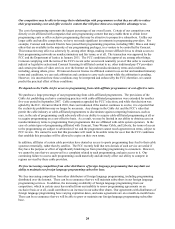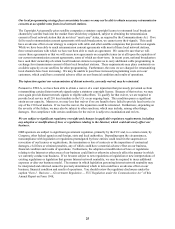Dish Network 2010 Annual Report Download - page 23
Download and view the complete annual report
Please find page 23 of the 2010 Dish Network annual report below. You can navigate through the pages in the report by either clicking on the pages listed below, or by using the keyword search tool below to find specific information within the annual report.16
16
Item 1A. RISK FACTORS
The risks and uncertainties described below are not the only ones facing us. Additional risks and uncertainties that
we are unaware of or that we currently believe to be immaterial may also become important factors that affect us.
If any of the following events occur, our business, financial condition or results of operations could be materially
and adversely affected.
We face intense and increasing competition from satellite and cable television providers, telecommunications
companies and providers of video content via the Internet, especially as the pay-TV industry matures, which may
require us to increase subscriber acquisition and retention spending or accept lower subscriber acquisitions and
higher subscriber churn.
Our business is focused on providing pay-TV services and we have traditionally competed against satellite and cable
television providers, some of whom have greater financial, marketing and other resources than we do. Many of
these competitors offer video services bundled with broadband, telephony services, HD offerings, interactive
services and video on demand services that consumers may find attractive. Moreover, mergers and acquisitions,
joint ventures and alliances among cable television providers, telecommunications companies and others may result
in, among other things, greater financial leverage and increase the availability of offerings from providers capable of
bundling television, broadband and telephone services in competition with our services. We and our competitors
increasingly must seek to attract a greater proportion of new subscribers from each other’s existing subscriber bases
rather than from first-time purchasers of pay-TV services. In addition, because other pay-TV providers may be
seeking to attract a greater proportion of their new subscribers from our existing subscriber base we may be required
to increase retention spending.
Competition has intensified in recent quarters as the pay-TV industry matures and the growth of video being
delivered via the Internet and fiber-based pay-TV services offered by telecommunications companies such as
Verizon and AT&T continues. These fiber-based pay-TV services have significantly greater capacity, enabling the
telecommunications companies to offer substantial HD programming content as well as bundled services. In
addition, the recent growth of video content being delivered via the Internet has made alternatives to traditional pay-
TV services available to customers. This increasingly competitive environment may require us to increase
subscriber acquisition and retention spending or accept lower subscriber acquisitions and higher subscriber churn.
Competition from digital media companies that provide/facilitate the delivery of video content via the Internet,
could materially adversely affect us.
Our business is focused on pay-TV services, and we face competition from providers of digital media, including
those companies that offer online services distributing movies, television shows and other video programming.
Moreover, new technologies have been, and will likely continue to be, developed that further increase the number of
competitors we face with respect to video services. For example, online platforms that provide for the distribution
and viewing of video programming compete with our pay-TV services. These online platforms may cause our
subscribers to disconnect our services. In addition, even if our subscribers do not disconnect our services, they may
purchase a certain portion of the services that they would have historically purchased from us through these online
platforms, such as pay per view movies, resulting in less revenue to us. Some of these companies have greater
financial, marketing and other resources than we do. In particular, programming offered over the Internet has
become more prevalent as the speed and quality of broadband and wireless networks have improved. In addition,
consumers are spending an increasing amount of time accessing video content via the Internet on their mobile
devices. These technological advancements and changes in consumer behavior with regard to the means by which
they obtain video content could materially adversely affect our business, results of operations and financial
condition or otherwise disrupt our business.


